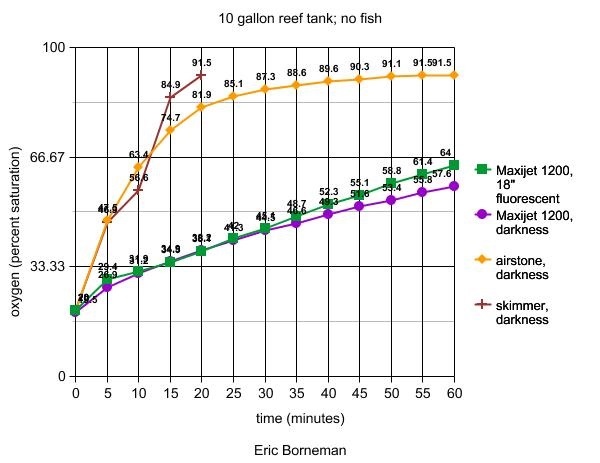Protein skimmers benefit water quality by facilitating two major processes - gas exchange and export of organic wastes.
These are both critical to the maintenance of optimum water conditions. The sad truth is that no captive system can ever truly duplicate the conditions found on a natural coral reef. Effective protein skimming can, however, bring us very close to this desired goal. The beneficial gas exchange that goes on inside of a protein skimmer is largely dissolution of atmospheric oxygen into the aquarium water. Other gases like nitrogen and hydrogen also play roles here, but we aren't as interested in them. Some evidence even suggests that ammonia might be "blown-off" into the atmosphere during protein skimming. It is important to keep dissolved oxygen levels as high as possible, since most organisms (fish, corals, inverts, etc.) we keep are used to these conditions found in the wild. Waste removal is accomplished through chemical interactions between charged particles of air and water, which allows proteins, trace elements, and other compounds to become attached to air droplets. These protein-laden air droplets then coalesce into a thick foam which is skimmed off into a collection cup. Those who are interested in the technical aspects of protein skimming should read Richard Harker's recent article in Marine Fish and Reef USA, which is an extremely informative document regarding the complex chemistry of the process. Delbeek and Sprung's The Reef Aquarium is another source of information regarding the topic..
Excerpt from this article from www.proteinskimmer.com
These are both critical to the maintenance of optimum water conditions. The sad truth is that no captive system can ever truly duplicate the conditions found on a natural coral reef. Effective protein skimming can, however, bring us very close to this desired goal. The beneficial gas exchange that goes on inside of a protein skimmer is largely dissolution of atmospheric oxygen into the aquarium water. Other gases like nitrogen and hydrogen also play roles here, but we aren't as interested in them. Some evidence even suggests that ammonia might be "blown-off" into the atmosphere during protein skimming. It is important to keep dissolved oxygen levels as high as possible, since most organisms (fish, corals, inverts, etc.) we keep are used to these conditions found in the wild. Waste removal is accomplished through chemical interactions between charged particles of air and water, which allows proteins, trace elements, and other compounds to become attached to air droplets. These protein-laden air droplets then coalesce into a thick foam which is skimmed off into a collection cup. Those who are interested in the technical aspects of protein skimming should read Richard Harker's recent article in Marine Fish and Reef USA, which is an extremely informative document regarding the complex chemistry of the process. Delbeek and Sprung's The Reef Aquarium is another source of information regarding the topic..
Excerpt from this article from www.proteinskimmer.com


